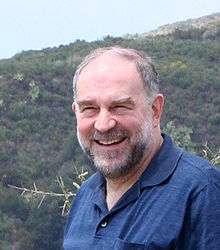Gaston Gonnet
Gaston H. Gonnet is a Uruguayan Canadian computer scientist and entrepreneur.[1] He is best known for his contributions to the Maple computer algebra system[3] and the creation of a digital version of the Oxford English Dictionary.[4][5][6]
Gaston Gonnet | |
|---|---|
 Gaston Gonnet in 2006. | |
| Born | Gaston Henry Gonnet Haas September 22, 1948 |
| Nationality | Uruguayan, Canadian, Swiss |
| Alma mater | University of Waterloo |
| Known for | Maple Computer Algebra OpenText |
| Scientific career | |
| Fields | Bioinformatics Scientific computation Computer algebra Machine learning[1] |
| Institutions | University of Waterloo, ETH Zurich |
| Doctoral advisor | J. Alan George |
| Doctoral students | Ricardo Baeza-Yates Christophe Dessimoz[2] |
| Website | www |
Education and early life
Gonnet received his doctorate in computer science from the University of Waterloo in 1977. His thesis was entitled Interpolation and Interpolation-Hash Searching. His advisor was J. Alan George.[7]
Career and research
In 1980 Gonnet co-founded the Symbolic Computation Group at the University of Waterloo.[3] The work of SCG on a general-purpose computer algebra system later formed the core of the Maple system. In 1988, Gonnet co-founded (with Keith Geddes) the private company Waterloo Maple Inc., to sell Maple commercially.[3] In the mid 1990s the company ran into trouble and a disagreement between his colleagues caused him to withdraw from chairman of the Board and managerial involvement. On June 9, 2011, Gonnet and Keith O. Geddes received the ACM Richard D Jenks Memorial Prize for Excellence in Software Engineering Applied to Computer Algebra for the Maple Project.
In 1984 Gonnet co-founded the New Oxford English Dictionary project at UW, which sought to create a searchable electronic version of the Oxford English Dictionary. The project was selected by the Oxford University Press as a partner for the computerisation leading to the publication of the second edition of the OED. The UW project's main contributions were in the parsing of the source text to enhance the tagging and on building a full text searching system based on PAT trees (a version of suffix array). This project later culminated in another successful commercial venture, the Open Text Corporation. Gonnet was founder and chairman of the Board of OTC until 1994.
Gonnet is a computer science professor at ETH Zurich in Zurich, Switzerland.[8] In 1991, he began developing the Darwin programming language for biosciences,[9] which would become the basis for OMA,[10] a package for gene orthology prediction. He is chief scientist of two Canadian startups: CeeqIT and Porfiau.
Awards and honours
On March 14, 2013 Gonnet was awarded a Dr. Honoris Causa by the Universidad de la República, engineering faculty from Uruguay.
References
- Gaston Gonnet publications indexed by Google Scholar

- Dessimoz, Christophe (2009). Comparative Genomics Using Pairwise Evolutionary Distances. ethz.ch (PhD thesis). ETH Zurich. doi:10.3929/ethz-a-005762050. OCLC 935351416.

- Haigh, Thomas (2005), Gaston Gonnet Oral history interview, 16–18 March, 2005, Zurich, Switzerland, Philadelphia, PA: Society for Industrial and Applied Mathematics
- Murphy, Cullen (February 1, 1989), "Caught in the Web of bytes: the electronic Oxford English Dictionary", The Atlantic, archived from the original on June 10, 2014.
- Interpolation and Interpolation-Hash Searching
- Publications and talks in Research Gate
- Gaston Gonnet at the Mathematics Genealogy Project
- Faculty listing, ETHZ, retrieved 2013-02-14.
- Gonnet, G. H.; Hallett, M. T.; Korostensky, C.; Bernardin, L. (2000). "Darwin v2.0: an interpreted computer language for the biosciences". Bioinformatics. 16 (2): 101–103. doi:10.1093/bioinformatics/16.2.101. PMID 10842729. S2CID 1531041.
- "About OMA". Retrieved 2017-11-10.